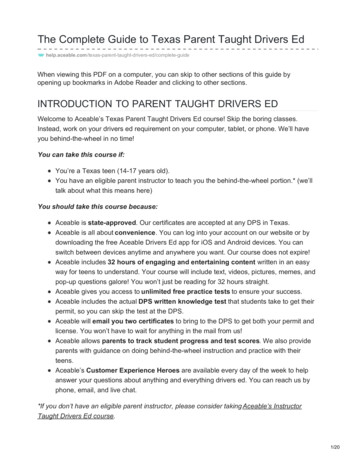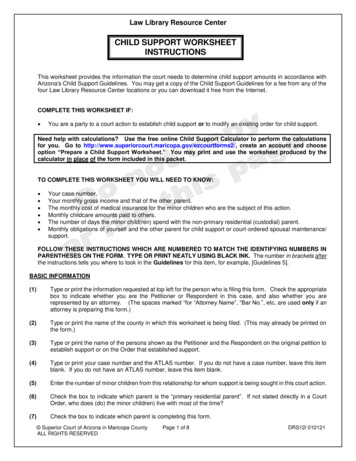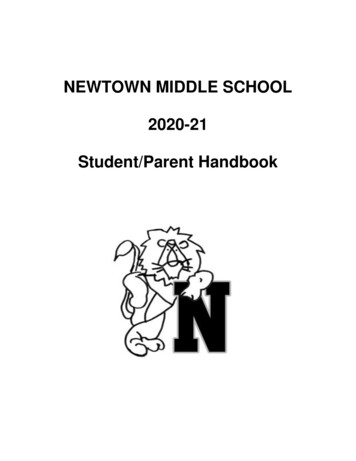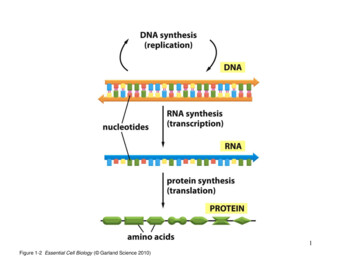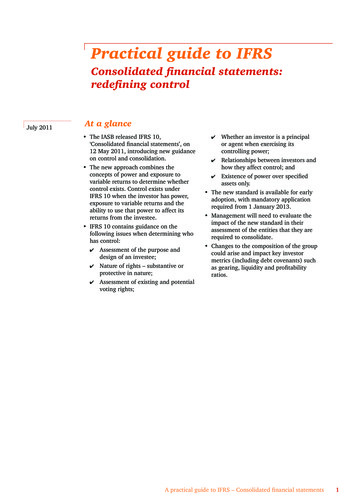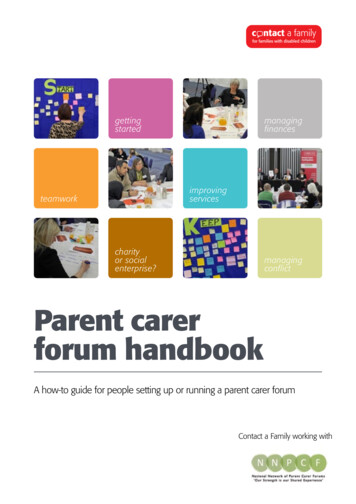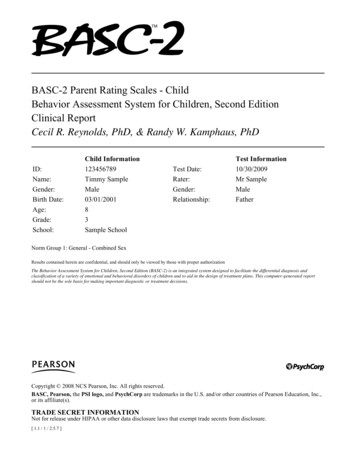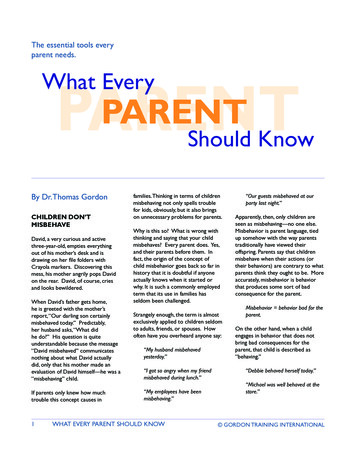
Transcription
The essential tools everyparent needs.What EveryPARENTPARENTShould KnowBy Dr. Thomas GordonChildren Don’tMisbehaveDavid, a very curious and activethree-year-old, empties everythingout of his mother’s desk and isdrawing on her file folders withCrayola markers. Discovering thismess, his mother angrily pops Davidon the rear. David, of course, criesand looks bewildered.When David’s father gets home,he is greeted with the mother’sreport, “Our darling son certainlymisbehaved today.” Predictably,her husband asks, “What didhe do?” His question is quiteunderstandable because the message“David misbehaved” communicatesnothing about what David actuallydid, only that his mother made anevaluation of David himself—he was a“misbehaving” child.If parents only knew how muchtrouble this concept causes in families. Thinking in terms of childrenmisbehaving not only spells troublefor kids, obviously, but it also bringson unnecessary problems for parents.Why is this so? What is wrong withthinking and saying that your childmisbehaves? Every parent does. Yes,and their parents before them. Infact, the origin of the concept ofchild misbehavior goes back so far inhistory that it is doubtful if anyoneactually knows when it started orwhy. It is such a commonly employedterm that its use in families hasseldom been challenged.Strangely enough, the term is almostexclusively applied to children seldomto adults, friends, or spouses. Howoften have you overheard anyone say:“My husband misbehavedyesterday.”“I got so angry when my friendmisbehaved during lunch.”“My employees have beenmisbehaving.”what every parent should know“Our guests misbehaved at ourparty last night.”Apparently, then, only children areseen as misbehaving—no one else.Misbehavior is parent language, tiedup somehow with the way parentstraditionally have viewed theiroffspring. Parents say that childrenmisbehave when their actions (ortheir behaviors) are contrary to whatparents think they ought to be. Moreaccurately, misbehavior is behaviorthat produces some sort of badconsequence for the parent.Misbehavior behavior bad for theparent.On the other hand, when a childengages in behavior that does notbring bad consequences for theparent, that child is described as“behaving.”“Debbie behaved herself today.”“Michael was well behaved at thestore.” Gordon Training International
“Thinking in terms ofchildren misbehaving notonly spells trouble forkids, obviously, but it alsobrings on unnecessaryproblems for parents.”enjoyable for children as well, ifparents would accept these simpleprinciples about children:Principle I:Like everyone else children haveneeds and to get their needsmet, they act or behave.If parents would strike the wordmisbehaving from their vocabulary,they would rarely feel judgmental andangry. Consequently, they would notfeel like retaliating with punishment,as in the situation with little Davidand his mother. All parents, however,do need to learn some effectivemethods for modifying behaviorthat interferes with their needs, butlabeling the child as misbehaving isnot one of them. Nor is punishment,of any kind.“We try to teach our children tobehave.”Principle II:Children don’t misbehave: theysimply behave to get their needsmet.Parents would be more effective,and life at home more pleasantfor everyone, if they would beginthinking about children’s behaviorin a different way. First, try toremember that all of children’sactions are behaviors. Each thingthey do or say is a specific behavior.Viewed in this way, all day long a childis behaving. And for the very samereason all other creatures engagein behaviors—they are trying to gettheir needs met.This does not mean, however, thatparents will like all of the behaviorsthat their children engage in. Norshould parents be expected to, forchildren are bound to do things thatproduce unacceptable consequencesfor their parents. Kids can be loudand destructive, delay you whenyou’re in a hurry, pester you whenyou need quiet, cause you extrawork, clutter up the house, interruptyour conversation, and break yourvaluables.An infant cries because he is hungryor cold or in pain. Something iswrong; his organism needs something.Crying behavior is the infant’s way ofsaying “Help.” Such behavior, in fact,should be viewed as quite appropriate(“good”), for the crying is apt to bringthe child the help that is needed.When seen as an organism behavingrather appropriately to get a needmet, the child certainly cannot beevaluated as misbehaving!Think about such behaviors thisway: they are behaviors children areengaging in to meet their needs. If atForgetting theirthe same timehumanness is thethey happenfirst serious mistake“Parents would be moreto interfereparents make oneffective, and life atwith yourentering parenthood.pursuit ofhome more pleasant forThey take on apleasure, thatheavy burden ofeveryone, if they woulddoesn’t meanresponsibility; theybegin thinking aboutthat the childdevelop feelings ofchildren’s behaviorsis misbehaving.guilt and inadequacy;in a different way.”Rather, herthey try too hard;particular waythey lose theirof behavingrealness. And theiris unacceptable to you. Don’tchildren suffer, too, because kidsinterpret that the child is trying to dodeeply appreciate their parents beingsomething to you—she is only tryingreal and human. Have you ever heardto do something for herself. And thiskids say, “My mom is a nice person”;does not make her a bad child or a“My father is a real guy”; “They’remisbehaving child.really great people”?Similarly, when three-year-old Davidwas exploring and removing thecontents of the desk, that behavior,seen as a manifestation of his needto see new shapes and sizes, handleobjects or draw, would not have beenlabeled by his mother as misbehaving.Family life would be infinitely lessexasperating for parents, and more what every parent should knowBe a Person, Not a“Parent”There is something about becominga parent that makes people forgetthat they are persons. They start toplay the role of a parent. Karen andSteve, two persons, suddenly feelthat they must transform themselvesinto Mom and Dad, two parents.Unfortunately, this transformationmakes people forget that they arestill human—with faults, limitations,feelings, inconsistencies, and, aboveall, rights. Gordon Training International
How can parents be persons totheir children? By understandinga few simple principles abouthuman relationships—truths thatapply equally to all parent-childrelationships.All parents have two sections intheir windows. That is to say, becauseparents are persons, not gods, someof their children’s behaviors will beunacceptable. A more direct way ofputting this: you won’t like what yourchildren are doing some of the time,and hence youwon’t really like“All parents need to learn them some of thetime.some effective methodsChildren inevitablydo things thatmake their parentsfeel exasperated,irritated,for modifying behaviorfrustrated, putthat interferes with their If you don’t like theupon, resentful,way that sounds,needs, but labeling thedisappointed, orjust remember thatchild as misbehaving isjust plain mad.at times you don’tChildren are nolike your spouse,not one of them.”different fromyour friends, youryour spouse orrelatives, and sorelatives or friends or co-workers,on. In these relationships with others,all of whom can, from time to time,however, their unacceptable behaviorsprovoke similar feelings. Imaginedo not usually have the same strongthat you always view your child’seffect on you, as a person, as do thebehaviors—everything he does orbehaviors of your children. Whensays—through a window in fronta friend does something that youof you. Now think of that windowdon’t like, you’re apt to excuse it asas having two sections, a topan idiosyncrasy: “That’s just the wayand a bottom section. Adopt theKatie is—forgetful.” Nor are you aptrule of viewing all of your child’sto feel responsible for the friend’sunacceptable behaviors through thebehavior—or to feel inadequate orbottom part of the window, and all oflike a failure.the acceptable behaviors through thetop, as in this picture:Yet when your children engage inbehavior that interferes with yourneeds, don’t you often feel thatAcceptableyou are somehow responsible? YouBehaviorsfeel parental responsibility for yourchildren’s behavior! What did you dowrong? You must be a bad parent!UncceptableBehaviorsPRINCIPLE III:Julie, running and playing loudlyoutside, is behavior you wouldprobably view through the top part ofyour window—it is acceptable to you.Julie doing the same thing in the livingroom, however, undoubtedly wouldbe viewed through the bottom partof your window—it is unacceptableto you. Parents can’t be accepting of allbehavior of their childrenYou’re feeling rested and energeticand happy with the world. Jack, your12-year-old, is playing his guitar withconsiderable gusto. It doesn’t botheryou at all; in fact, you’re delightedto see him getting such a kick outof practicing. Jack’s behavior iswhat every parent should knowseen through the top part of yourwindow—it’s quite acceptable to you.AcceptableBehaviorsJack playingguitarUnacceptableBehaviorsIt is two days later, and you’reexhausted and trying to catch a halfhour nap. Jack again starts to play hisguitar loudly. You know that you can’tdrop off to sleep with that darnedguitar blasting in your ears. It is veryunacceptable to you-you see Jack’sguitar playing today in the bottompart of your k playingguitarAre you being inconsistent? Ofcourse. But for a very good reason.You are a different person today fromthe person you were two days ago.Being human, you change. But youwere real then, and you are real today.If you had reacted consistently bothdays, you would have been unreal oneof those days—phony, if you will.Being inconsistent in your reactionto a child’s behavior is being a realperson; it is also inevitable. Despitethe advice of countless child-rearingexperts, parents can and will beinconsistent. And I would say thatthey should be inconsistent. Gordon Training International
PRINCIPLE IV:Parents don’t have to beconsistent with children.realizes that he or she will inevitablyfeel different on different daysabout the same behavior. Parentsare people, notBut what aboutgods. They dothe effect on thenot have to act“Forgetting theirchild? In the firstunconditionallyhumanness is the firstplace, childrenaccepting towardunderstand thatall behaviors, orserious mistake parentstheir parents haveeven consistentlymake on enteringgood days and bad,accepting towardparenthood.”that one situationone behavior.can be differentNeither shouldfrom another. Itthey pretend to behappens to them!accepting in orderSecond, kids grow to respect parentsto present a united front.who are honest about their feelings,and grow to distrust those who arePRINCIPLE V:not.Parents don’t have to put up a“united front.”The traditional belief in beingconsistent also influences mothersWhile all children would undoubtedlyand fathers to think that they mustprefer to be accepted all the time,always be consistent or united withthey can constructively handle theireach other’s reactions to their child’sparents’ unaccepting feelings whenbehavior. This, too, is nonsense.the parents send honest messagesParents are told to back each otherthat match their true feelings.up so that the child believes that bothNot only does this make it easierparents feel the same way about afor children to learn to judge theparticular unacceptable behavior.appropriateness of various behaviors,but it also helps them grow to seeWhat is wrong with this entrenchedtheir parents as real persons—idea is that it requires one parent totransparent, human, and people withbe untrue to his or her real feelings.whom they would like a relationship.It asks one parent to play a role, bephony. Again, children are able toYou Can Changeperceive such phoniness, and theyBehavior You Don’tdislike it. An adolescent girl confirmedLike without Usingthis for me when she said, “I don’tPunishmentrespect my father—in fact I hatehis weakness. Whatever my motherWhen children’s behavior interferesfeels about things I do, he takes herwith their parents’ needs, as itside even though I know he doesn’tinevitably will, parents naturally wantagree.”to try to modify such behavior. AfterParents cannot hide their truefeelings, and they should not try.Rather, parents should accept the factthat one parent may feel acceptingof a behavior and the other feelunaccepting. The effective parent all, parents do have needs. They havetheir own lives to live and the rightto derive satisfaction and enjoymentfrom their existence. But parentsmake two serious mistakes.First, much to their regret, manyparents ignore unacceptablewhat every parent should knowbehaviors and watch their childrengrow up to be terribly inconsiderateor even oblivious to their parents’needs. If parents permit this, theydevelop strong feelings of resentmentand even grow to dislike suchungrateful or selfish kids. Second,most parents choose punishmentas their first approach in trying tomodify unacceptable behavior. Ifparents permissively ignore behaviorthey don’t like, they suffer; if theyrely on punishment, their kids suffer.And in both cases the relationshipsuffers. But what can parents do sothat children learn to respect theirparents’ needs and rights? There areeffective methods for infants, toddlers,and older children.With Infants and PreverbalChildrenVery young children, who maybe unable to understand verbalmessages, present a special problem“Being inconsistentin your reaction to achild’s behavior is beinga real person; it is alsoinevitable.”for parents. Nevertheless, it is actuallyquite easy to influence infants andpreverbal children to modify behaviorunacceptable to parents, providedthe right approach is used. Parentscan choose from four differentapproaches—all very effective: The guessing game “Let’s make a trade” The nonverbal I-Message Changing the environment Gordon Training International
The guessing game: Effectiveparents must learn to be goodguessers with infants and toddlerssimply because these children can’ttell parents much about what’sgoing on inside them. Emily, sixmonths old, starts to cry loudly inthe middle of the night. Her parentsare awakened from the sleep theyneed and naturally find this behaviorunacceptable. But how can they getEmily to stop crying? Quite simply,they start guessing. Finding the causeof her crying so that they can remedythe problem is something like apuzzle.Maybe she’s wet and cold. We’llcheck first on that. No, she’s stilldry. Well, could it be we didn’tburp her enough, and she is feelinguncomfortable with gas? Let’s pickher up and start the burping process.Bad guess again—Emily won’t burp.Wonder if she’s hungry? There is stillsome milk in her bottle, but it gotpushed down to the end of the crib.We’ll act on that hypothesis next.Success! Emily sucks for a fewminutes and then gets sleepy. Theyput her back into her crib gently, andshe falls asleep. Her parents can goback to bed now and get their ownneeds met.That is an example of the guessinggame, an approach that parents haveto use very frequently with infantswhen they whine incessantly, whenthey are restless and pestering,when they can’t get to sleep, whenthey throw their food on the floor.The guessing game works effectivelybecause when infants do things thatare unacceptable to their parentsthere’s a reason for it—usually a verylogical reason. When parents startusing the guessing game, they stopresorting to punishment. PRINCIPLE VI:When infants behaveunacceptably, there is a goodreason, but you have to try toguess what it is.touch and tug. Her needs are met andso are yours.“It is actually quite easyto influence infantsand preverbal childrento modify behaviorunacceptable to parents,provided the rightapproach is used. “Sometimes parents find the guessinggame easy; other times moredifficult. The cliched “if at first youdon’t succeed, try, try again” is thesoundest advice I know for parents.Actually, parents can get quite goodat the game because they get toknow their offspring better andbetter. Parents have told me thatthey eventually learned to tell thedifference between a wet-cry, ahungry-cry and a gas-cry.“Let’s make a trade.” Anotherapproach for changing unacceptablebehaviors of infants and toddlersinvolves trading: substituting theunacceptable behavior for anotherbehavior that would be acceptable tothe parent.Laura, your curious one-year-old, hasfound a pair of your new stockings,which she finds enjoyable to touchand tug on.You find this unacceptablebecause you’re afraid she’ll snag ordestroy them. You go to your drawerand pull out an old pair that is alreadysnagged and beyond being wearable.You place this pair in her hands andgently take away the new pair. Laura,not knowing the difference, finds thedamaged pair equally as enjoyable towhat every parent should knowDave is jumping up and down on thecouch, and his mother fears that hewill knock the lamp off the end table.She gently but firmly removes Davefrom the couch and proceeds to jumpup and down with him on the pillows,which she removed from the couchand put on the floor.Shelly, age 18 months, starts to get upon her dad’s lap on the very night heis dressed in his freshly cleaned lightcolored suit. Dad notices that Shelly’shands are covered with jam mixedwith equal parts of peanut butter.Dad gently restrains Shelly, but thenimmediately goes to the bathroom,gets a wet washcloth, and wipes herhands clean. Then he picks Shelly upand puts her on his lap.Again, when parents start thinkingin terms of trading, they stop usingpunishment.PRINCIPLE VII:When you can’t accept onebehavior, substitute another youcan.The nonverbal I-Message. Olderchildren often modify their behaviorafter a parent sends them an honestmessage that conveys how the parentis affected by the child’s behavior, asin:“I can’t hear on the phone whenthere’s so much yelling.”“I’m afraid I’ll be late if you taketoo long to dress.”“I Iove that little dish, and I wouldbe sad if it got broken.”But children too young to understandwords won’t be influenced by such Gordon Training International
messages (called “I-Messages”because they convey to the child“Let me tell you how I am feeling”).Consequently, the I-Message has tobe put into a nonverbal form, as inthe following examples:her parent provides her with somematerials that capture her interest,such as clay, finger paints, puzzles,picture books, or old scraps ofcolored cloth. This is called “Enrichingthe Environment.”While Dad is carrying little Tony inthe supermarket, he starts to kickDad in the stomach, laughing witheach kick. Dad immediately putsTony down on his feet and continueswalking. (Message: “It hurts me whenI get kicked in the stomach; so I don’tlike to carry you.”)At other times kids need just theopposite. They’re keyed up andhyperactive just before bedtime,for example, so the wise parentknows how to “Impoverish theEnvironment.” Overstimulatedchildren often will calm down if theyare read or told a story (real orfiction), or if they have a quiet periodof sharing the day’s events. Muchof the storm and stress of bedtimecould be avoided if parents made aneffort to reduce the stimulation oftheir children’s environment.Judy stalls and pokes getting intothe car when her mother is in aterrible hurry. Mother puts herhand on Judy’s rump and gently butfirmly guides her onto the front seat.(Message: “I need you to get in rightnow because I’m in a hurry.”)PRINCIPLE VIII:Let kids know how you feel, evenif you can’t use words.Most unacceptable (and destructive)behavior of toddlers can be avoidedby serious efforts on the partof parents to “Child-proof theEnvironment,” as with:The key to employing this methodof trying to modify unacceptablebehavior is avoiding any kind ofbehavior that will be punishing orpainful to the child. After all, youonly want him to know how you arefeeling. Slapping, hitting, thumping,pushing, jerking, yelling, pinching—all these methods inevitablycommunicate to the child that he’sbad, he’s wrong, his needs don’t count,he’s done something criminal, and hedeserves to be punished. Buying unbreakable cups andglasses Changing the environment. Mostparents intuitively know that oneeffective way of stopping many kindsof unacceptable behavior is to changethe child’s environment, as opposedto efforts to change the child directly.What parent has not watched awhiny, pestering, bored child gettotally (and quietly) immersed whenPRINCIPLE IX:It’s often more efficient tochange the child’s environmentthan to change the child. them, hoping that they will takeinto consideration your needs anddecide on their own to change theirbehavior. By far the most effectivemethod is to send a verbal I-Message.As explained previously, an I-Messageis one that communicates to the childonly what is happening to you as aconsequence of his behavior, as in thefollowing examples:“When the TV is on so loud, I can’ttalk with your mom.’’“I’m not going to enjoy the flowers Iplanted if they’re trampled on.”While it appears to be straightforward, sending I-Messages is noteasy to learn, primarily becausemost parents are so locked intothe habit of sending You-Messageswhen they encounter unacceptablebehavior. You-Messages contain aheavy component of blame, judgment,evaluation, threat, power or putdowns. Here are the most commontypes of You-Messages: YOU clean up that mess.(ORDERING)Putting matches, knives, andrazor blades out of reach If YOU don’t stop that, you’ll go toyour room. (WARNING) Relocating medicine andhousehold cleaners Keeping the basement doorlockedYOU shouldn’t come to the tablewithout washing your hands.(PREACHING) Securing slippery throw rugsYOU could go outside and play.(ADVISING) YOU ought to know better.(MORALIZING) YOU are acting like a baby.(EVALUATING) YOU are just showing off.(ANALYZING)With Older ChildrenWhen children understand verballanguage, you can talk straight towhat every parent should know Gordon Training International
YOU need to learn some manners.(TEACHING) YOU are driving me to an earlygrave. (INDUCING GUILT) Look at these gray hairs YOU havecaused me. (BLAMING)Instead of influencing kids tochange, You-Messages make childrendefensive and resistive to change,and over time they seriously shatterchildren’s self-esteem. What’s more,they provoke youngsters to strikeback with a You-Message of theirown, causing the situation to escalateinto a verbal battle royal, oftenbringing tears, hurt feelings, slammeddoors, threats of punishment, and afractured relationship.I-Messages, on the other hand, aremuch less apt to provoke resistanceto change. When kids hear thattheir parents are hurting, theirnatural desire to help out emerges.Furthermore, when kids are not putdown or blamed for having theirneeds, they are much more willingto be considerate of their parents’needs.PRINCIPLE X:To change unacceptablebehavior of your child, talk aboutyourself, not your child.Probably the greatest reward forparents who learn to send I-Messagesis that their children eventually modelafter them. To tell your child honestlyhow you feel is revealing your ownhumanness. She learns that youcan be hurt, tired, disappointed,harried, worried, and fearful. Suchhonesty on your part will serve as amodel, and you will see your childrenbegin to be honest and real withyou. Instead of being strangers inthe same household, as in so many families, parents and children developan authentic and open relationship.Parents experience the job of havinghonest children, and the children areblessed by having real persons asparents.The Terrible Dangersof DisciplineAsk 100 parents, “Should children bedisciplined?” and 90 unhesitatinglywill answer, “Of course.” That parentsshould discipline their children hasbeen so commonly believed (andstrongly defended) that to questionthe validity of the idea may seem likesome kind of heresy or foolishness.Yet, I know of no other belief thatcauses parents more trouble thandoes the concept of discipline. Fromexperience working with thousandsof parents in Parent EffectivenessTraining classes, I have becomeconvinced that it is actually a verydangerous belief, for it alienatesparents and children and thuscontributes to the deterioration ofparent-child relationships.What is this discipline parentsfeel they need to use? What doesit mean? The dictionary definesdiscipline as punishment by onein power in order to bring aboutobedience. The key to the termdiscipline is the concept of poweror authority—power to obtainobedience or power to enforce orderby using punishment.Officers discipline their subordinates;animal trainers discipline dogs inobedience school; teachers disciplinetheir students; parents discipline theirchildren. But where do all thesepeople get their power?Power is acquired when one personpossesses what another personneeds badly; we call these rewards.The teacher has grades to handout, and the dog trainer has food tooffer the hungry dog. Power also isacquired when one person possessesthe means for inflicting pain ordiscomfort on another; we call thesepunishments. The teacher can keepstudents after school or send themto the viceprincipal’s office;the dog trainercan jerk the choke“I know of no other belief chain and hurt thethat causes parents more dog’s neck.Interestinglyenough, mostparents whodiscipline theirchildren aretrouble than does themotivated byRewards andthe best ofconcept of discipline.”punishments giveintentions. Theypeople power,want their kidsand power is theto be responsible,basis for theirdependable,position of authority over others.thoughtful, courteous, competent, andConsequently, when parents say thatmuch more. Parents simply know ofthey use their authority in discipliningno other way to carry out their goodkids, they mean that they make useintentions. So they use discipline.of rewards and punishments. TheyThen, when they find that disciplineoffer (or promise) rewards to getisn’t working well, they usually decidethe behavior they want from theirthat they should discipline even morechildren, and they inflict (or threatenstrongly. And so it goes, until kidsto inflict) punishment to get rid ofrebel, retaliate or leave home.behavior they don’t want. Soundseasy, doesn’t it?what every parent should know Gordon Training International
In practice, however, discipliningchildren through rewards andpunishments is not nearly as easyas it sounds. There are pitfalls forthe parent, and some can be quitedangerous and destructive for theparent-child relationship.families turn out to be frustrating,stressful, and stormy.In the first place, parents areinevitably going to run out of power.When children are very young,parents have a great deal of powerover them. Parents possess a lotof rewards that work quite welland punishments that make kidstoe the mark. As children get older,however, parents begin to runout of effective rewards, as wellas potent punishments. Rewardsthat once worked for them aremet with disinterest. In the case ofpunishment, children begin to resistor rebel. When they reach the teenyears, their parents come up emptyhanded.Apart from the inevitable parentalimpotency that follows from theearly use of power, there are otherconsequences of disciplining childrenthat are destructive to the parent, tothe child, and to their relationship.Parents are often unaware of the factOne father in a Parent EffectivenessTraining class expressed it this way:“My son is 15 now, and the onlysource of power I have left is thecar keys. And in six months thatwon’t work because he’ll have hisown car.”The mother of a 14-year-old girladmitted:“Annie simply ignores most of mypromises of gifts and favors. ‘Whoneeds it?’ she says, and then shekeeps on doing what she pleases.”Parents who have relied heavily ondisciplining their children when veryyoung discover to their dismay thatthey have run out of power whenthe kids reach adolescence. And thenthey find that they don’t have anyother way to influence their kids. Thisis why the adolescent years for most PRINCIPLE XI:Parents who use powerinevitably run out of it when kidsget older.“Parents who have reliedheavily on discipliningchildren when very youngdiscover to their dismaythat they have run outof power when the kidsreach adolescence.”that children, faced with a discipliningparent wielding power with rewardsand punishments, develop copingmechanisms—learned responses(often becoming habitual) to helpthem deal with, adjust to, or fightagainst their parents’ attempts tocontrol or mold them.In Parent Effectiveness Trainingclasses, parents are asked to recalltheir own youth, when parents(and teachers) used power overthem, and then to list the variouscoping mechanisms they adopted inresponse to their parents’ disciplineefforts. The composite list includespractically every one of the followingcoping mechanisms: Resistance, defiance, rebellion,negativismResentment, anger, hostilityRetaliation, aggression, hitting backwhat every parent should know Lying, hiding feelings,clamming upBlaming others, tattlingBossing, bullyingNeeding to win, cheating, hating toloseOrganizing against parents,combining forcesSubmission, compliance, fearButtering up, currying favorConformity, lack of creativity,needing to be proper and safe,passivityWithdrawing, escaping, fantasizingWhen parents grasp the idea thattheir own children are going touse identical coping mechanismsin response to their authority anddiscipline, they begin to wonder whyany parent would want to use powerand authority to discipline children.In fact, it is my experience that mostparents do not enjoy being dictatorial,demanding, and punishing. They don’treally want to coerce children; theywant to influence them.PRINCIPLE XII:Children learn to cope withparental power with undesirableand unhealthy behaviors.Parents, of course, would like to seetheir c
that interferes with their needs, but labeling the child as misbehaving is not one of them. nor is punishment, of any kind. bE A PERsoN, NoT A “PARENT” there is something about becoming a parent that makes people forget that they are persons. they start to play the role
